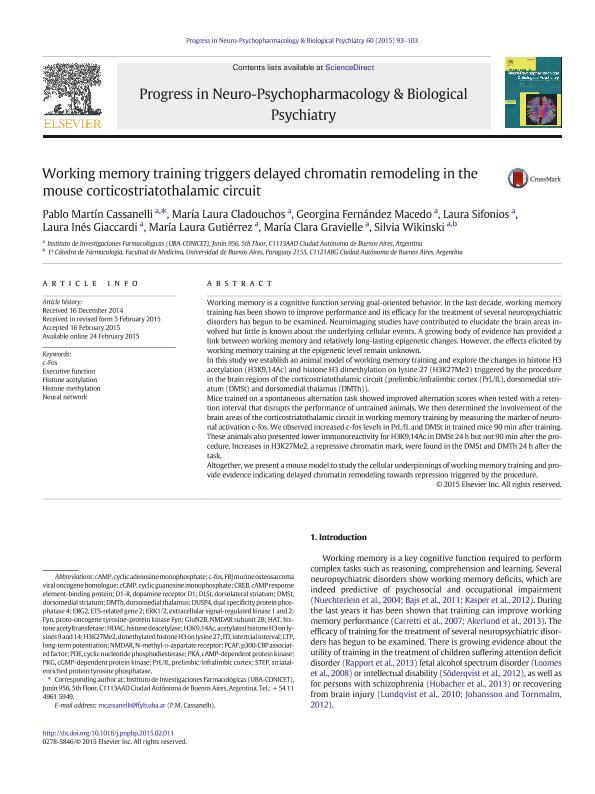Artículo
Working memory training triggers delayed chromatin remodeling in the mouse corticostriatothalamic circuit
Cassanelli, Pablo Martín ; Cladouchos, María Laura
; Cladouchos, María Laura ; Fernández Macedo, Georgina Valeria
; Fernández Macedo, Georgina Valeria ; Sifonios, Laura Lucrecia
; Sifonios, Laura Lucrecia ; Giaccardi, Laura Inés; Gutiérrez, María Laura; Gravielle, Maria Clara
; Giaccardi, Laura Inés; Gutiérrez, María Laura; Gravielle, Maria Clara ; Wikinski, Silvia Ines
; Wikinski, Silvia Ines
 ; Cladouchos, María Laura
; Cladouchos, María Laura ; Fernández Macedo, Georgina Valeria
; Fernández Macedo, Georgina Valeria ; Sifonios, Laura Lucrecia
; Sifonios, Laura Lucrecia ; Giaccardi, Laura Inés; Gutiérrez, María Laura; Gravielle, Maria Clara
; Giaccardi, Laura Inés; Gutiérrez, María Laura; Gravielle, Maria Clara ; Wikinski, Silvia Ines
; Wikinski, Silvia Ines
Fecha de publicación:
07/2015
Editorial:
Elsevier Inc
Revista:
Progress of Neuro-psychopharmacology and Biological Psychiatry
ISSN:
0278-5846
Idioma:
Inglés
Tipo de recurso:
Artículo publicado
Clasificación temática:
Resumen
Working memory is a cognitive function serving goal-oriented behavior. In the last decade, working memory training has been shown to improve performance and its efficacy for the treatment of several neuropsychiatric disorders has begun to be examined. Neuroimaging studies have contributed to elucidate the brain areas involved but little is known about the underlying cellular events. A growing body of evidence has provided a link between working memory and relatively long-lasting epigenetic changes. However, the effects elicited by working memory training at the epigenetic level remain unknown. In this study we establish an animal model of working memory training and explore the changes in histone H3 acetylation (H3K9,14Ac) and histone H3 dimethylation on lysine 27 (H3K27Me2) triggered by the procedure in the brain regions of the corticostriatothalamic circuit (prelimbic/infralimbic cortex (PrL/IL), dorsomedial striatum (DMSt) and dorsomedial thalamus (DMTh)). Mice trained on a spontaneous alternation task showed improved alternation scores when tested with a retention interval that disrupts the performance of untrained animals. We then determined the involvement of the brain areas of the corticostriatothalamic circuit in working memory training by measuring the marker of neuronal activation c-fos. We observed increased c-fos levels in PrL/IL and DMSt in trained mice 90 min after training. These animals also presented lower immunoreactivity for H3K9,14Ac in DMSt 24 h but not 90 min after the procedure. Increases in H3K27Me2, a repressive chromatin mark, were found in the DMSt and DMTh 24 h after the task. Altogether, we present a mouse model to study the cellular underpinnings of working memory training and provide evidence indicating delayed chromatin remodeling towards repression triggered by the procedure.
Archivos asociados
Licencia
Identificadores
Colecciones
Articulos(ININFA)
Articulos de INST.DE INVEST.FARMACOLOGICAS (I)
Articulos de INST.DE INVEST.FARMACOLOGICAS (I)
Citación
Cassanelli, Pablo Martín; Cladouchos, María Laura; Fernández Macedo, Georgina Valeria; Sifonios, Laura Lucrecia; Giaccardi, Laura Inés; et al.; Working memory training triggers delayed chromatin remodeling in the mouse corticostriatothalamic circuit; Elsevier Inc; Progress of Neuro-psychopharmacology and Biological Psychiatry; 60; 7-2015; 93-103
Compartir
Altmétricas



